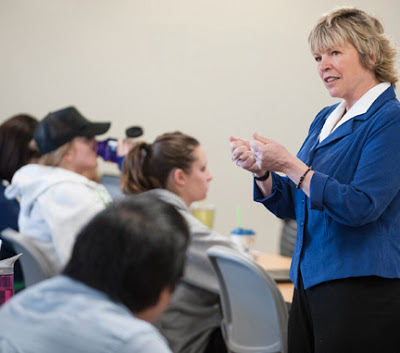 |
| Yours Truly at CHWE conference. |
During one of the sessions, I was captivated by the remarks made by Beth Ulrich, EdD, RN, FACHE, FAAN, a senior partner at Innovative Health Resources and editor of Nephrology Nursing Journal. Among her many achievements, Ulrich and her colleague, Peter Buerhaus, PhD, RN, FAAN, Valere Potter Professor of Nursing at Vanderbilt University, have been researching and trending nursing workforce data for a number of years. I took several notes, jotted down some of the highlights, and shared them with my leadership students upon returning to Boise.
Part of Ulrich’s presentation focused on the need and desire of nurses to be both respected and meaningfully recognized. Interestingly, these concepts—respect and meaningful recognition— are often ill-defined and left to personal interpretation. Following up on this deficiency of definition, I asked my senior nursing students to free write their responses to the following questions: 1) In your opinion, what does it mean to be respected as a nurse? 2) What does it mean to be meaningfully recognized for your work as a nurse?
 |
| Back in Boise with my students. |
The student responses were illuminating. With regard to the first question, they overwhelmingly reported that they want to be treated as valuable colleagues and vital members of the health care team. They want to have meaningful input into patient-care decisions and their opinions heard, and to be an integral and trusted member of an interprofessional team. Additionally, respect means to be treated with dignity, civility, and kindness.
One student wrote: “I really want to be treated like a professional and to have other health care workers come directly to me with their concerns if they see I need help. I hope they will ask me for input, learn to trust my judgment, and provide me with constructive feedback to help me grow as a professional nurse.”
Another wrote: “I know it will take time, but I hope to enjoy a high level of respect by having my ideas carefully considered and not dismissed completely out of hand. I don’t want to be talked down to, belittled, or ignored. I want to instill confidence in my patients and co-workers.”
Another student summed it up this way: “Please show me kindness, value my contributions, teach me without malice, and be mindful of my need for time off—please don’t call me into work when you know I’m exhausted and need to refuel—and I promise to always do my best.”
Respect means taking time to really listen and giving someone our full attention. I recently heard Naomi Judd express the following, “What we really need is not a good talkin’ to but, instead, a good listenin’ to.” My students and I couldn’t agree more. As one student noted, “Respect is allowing another person to completely and fully express their ideas with a genuine attempt to understand, and doing so without bias or judgment.”
As to the second question about meaningful forms of recognition, the vast majority of my students expressed a desire to be acknowledged by their patients, co-workers, and other members of the health care team. They want the acknowledgement to be specific and personalized—not just a generalized “Good job!” Others described meaningful recognition as being sought out by their peers and being appreciated as a valuable team member. Only a few mentioned salary increases as a mean of recognition, while others wanted organizational support and opportunities for advancement to achieve their career goals.
This free-write assignment provided an excellent platform for group discussion and conversation. In fact, some students wanted to know how I would respond to the two questions. To me, respect is a mutual process where people—including me—act with grace, candor, appreciation, and consideration. It means treating people with dignity and living by the “Civility Wisdom” described in my recent book, Creating & Sustaining Civility in Nursing Education (Clark, 2013, p. 207)—to practice forgiveness, express gratitude, affirm others, exceed expectations, address unkindness, and stand for something good. To me, meaningful recognition is a reciprocal process where genuine gratitude is expressed and where self and others are acknowledged for their ideas and contributions. Meaningful recognition is a basic, fundamental human need and vital to our inherent sense of self-worth.
Shortly after class, a student came by my office and told me she had been deeply affected by our class discussion. She said, when she graduates and begins her nursing career, she plans to ask her co-workers how they perceive respect and how each of them would like to be meaningfully recognized, and then she plans to follow-through.
What strikes me most about my students’ comments is the simplicity and elegance of their responses and how, in nearly every case, respect and recognition cost nothing in terms of dollars and cents. Instead, respect and recognition are mostly about displays of kindness and consideration, and honest acknowledgement of a job well done. Perhaps each of us can learn from our students, colleagues, and nurses in practice by asking our selves and each other, what does it mean to be respected and meaningfully recognized? And then, how will we demonstrate both?
Reference:
Clark, C.M. (2013). Creating & sustaining civility in nursing education, Indianapolis, IN: Sigma Theta Tau International.
For Reflections on Nursing Leadership (RNL), published by the Honor Society of Nursing, Sigma Theta Tau International.